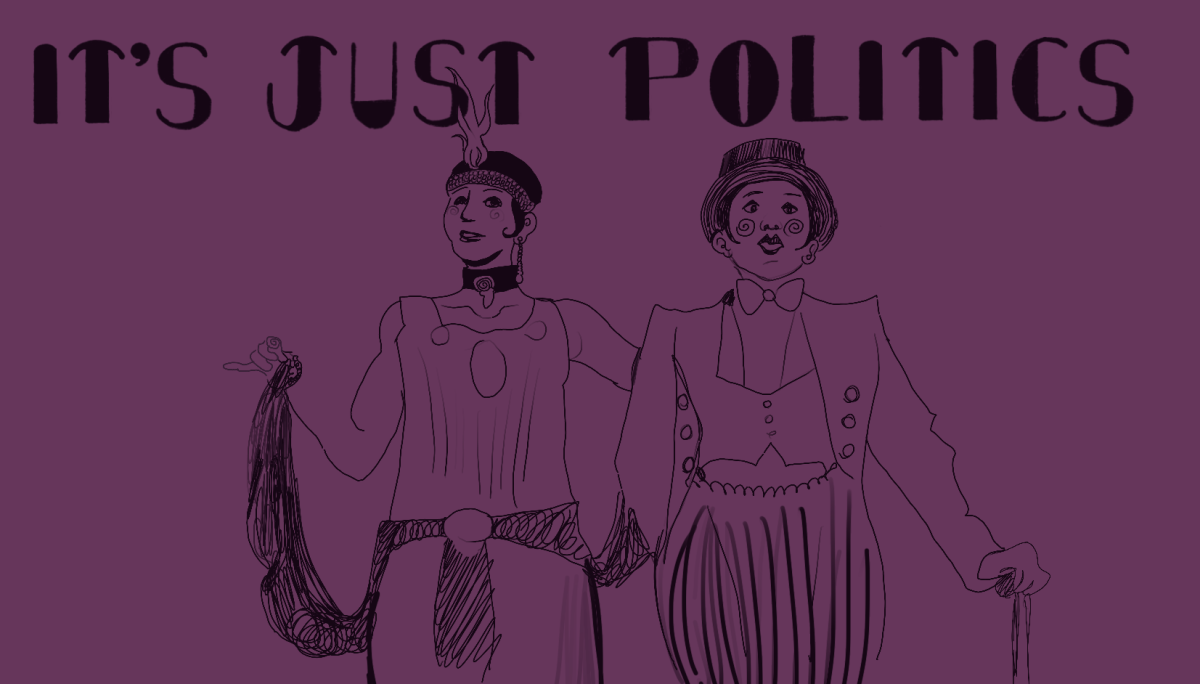Immediately opening with shots of glamorous costumes and a sparkling backdrop, the musical “Cabaret” introduces audiences to the Kit Kat Club, where you can “leave your troubles outside” because “here life is beautiful.” Set in 1930s Germany, the club is portrayed as a place where people are free to be themselves in a safe setting. However, as the show continues, the characters begin to lose their identity and individuality as the rise of Nazism and fascism comes to fruition — the same beginnings we’re starting to see in America.
Throughout Act 1, we see the songs slowly convert to darker undertones. The last song of the act, “Tomorrow Belongs to Me,” starts off as a German folk song sung by a bystander that is revealed to have Nazi paraphernalia on. This is the first time the audience sees how subtle Nazism ideology permeates the stage and the show. The fun, upbeat tempo songs slowly change into ones with marching, nationalist lyrics and messages.
By the end of the musical, we see almost all the main characters lose their personalities, and potentially their lives, to the Nazi regime. Sally Bowles, the main female performer, begins the show exuberantly, just looking for a fun time and to perform. However, by the end, she has an abortion to continue her carefree lifestyle, and although someone offers to take her away from Germany, she elects to stay despite the growing fascist regime. She hopes she can ignore the troubles of the world and continue with the Cabaret, ultimately losing the love of her life and her baby to stay in her naive version of the world.
Inside the cabaret, the characters saw themselves immune to the world and atrocities before them. Since they thought it wouldn’t affect them and would go away if they ignored it, the fascist regime caught up to them and had disastrous consequences for all involved.
One of the most frightening stories behind this musical is that it’s based on the real-life story of Christopher Isherwood, who traveled to Berlin in the 1920s to experience the Jazz Age. While there, he realized the political climate and fled to England. However, many of the friends he met in cabarets and nightclubs ended up dying in concentration camps, stuck in the country before they realized it was too late.
The characters felt so disconnected from the political climate that one character in the 1972 movie said, “The Nazis are just a gang of stupid hooligans, but they do serve a purpose. Let them get rid of the Communists. Later we’ll be able to control them.” They felt protected from the regime because the hate wasn’t affecting them, but as history has shown, once one group is targeted, no one will be entirely safe.
In Trump’s modern America, legislation actively targets immigrants, the LGBTQ community and Native Americans. If you are someone who doesn’t identify with one of these groups, it can feel easy to stay removed from the conflict. Even though we might think these beliefs and laws are wrong, it’s simpler to say it’s just four years, and the tide will pass once someone new is elected. However, ignorance of politics is what can allow fascists to come to power, as it sealed the fates of the characters in “Cabaret.”
Throughout Trump’s administration, he’s used derogatory language to describe marginalized groups, such as calling Haitian immigrants “animals” and Black district attorneys “rabid.” By using this rhetoric, he strips humans of their identity. This language teaches Americans that this language is not only acceptable but can get someone elected president.
This normalization has already had its consequences, with hate crimes, especially against LGBTQ+ individuals, on the rise. In addition, within just over a month into office, we’ve already seen the revocation of the Equal Employment Opportunity Act, a law that previously protected discrimination in the workforce.
When the rights of marginalized communities are at risk, it affects America as a whole, as it crumbles the foundation of a democracy built on equal opportunity for all. Rather than basic civil rights being certain, they are up in the air — and just because you are not one of the groups affected at the moment, that doesn’t mean that it won’t come back to you. “Cabaret” shows this exact scenario, and America can’t be at risk of falling into the same trap.
This musical serves as a warning for us all that hate is a disease, and once it spreads, no one is immune. Before a performance, musician Marty Lauter gave the introduction of “You’ve probably all seen the meme that’s like, how did we go from Brat summer to fascist winter? I hate to break it to you, girl, that’s literally the plot of Cabaret.” The characters in the musical felt so indifferent to politics because of their bubble, and we cannot make the same mistake of falling into complacency. Quite simply, we have to learn from the errors of the past, and not look back one day wondering where it all went wrong, or even worse, how we just sat back and watched.
Emma Hannan is the Digital Editor who wishes people had a little more media literacy. To write, email her at emh249@pitt.edu.


